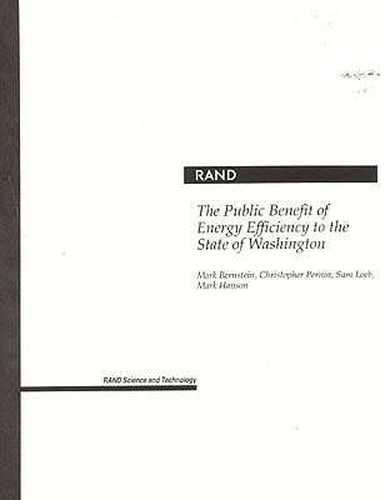Readings Newsletter
Become a Readings Member to make your shopping experience even easier.
Sign in or sign up for free!
You’re not far away from qualifying for FREE standard shipping within Australia
You’ve qualified for FREE standard shipping within Australia
The cart is loading…






Addresses the public benefits of improvements in energy efficiency to the economy of Washington state. Under the sponsorship of the Energy Foundation, a partnership of major foundations interested in sustainable energy, the authors estimated energy efficiency using measures of energy intensity that have been controlled for sectoral composition and energy prices, among other factors. They then used this estimate to address the public benefits of energy efficiency improvements in the industrial and commercial sectors to Washington state’s economy from 1977 to 1997. The study also predicts the potential future impact of continued improvements in energy efficiency. The authors found that declines in energy intensity have been associated with increased economic growth, improved air quality, and direct benefits to Washington residents. Future increases in energy intensity, however, could reverse these achievements. In addition, they point out that, although energy-efficient programs at the household level provide very real benefits for low-income consumers, the federal Low-Income Home Energy Assistance Program does not fully serve Washington’s eligible population. (MP) The authors estimated energy efficiency by means of energy intensity measures controlled for sectoral composition and energy prices, among other factors. Using this estimate, they address the public benefits of energy efficiency improvements in the industrial and commercial sectors to Washington state’s economy from 1977 to 1997. They found that declines in energy intensity have been associated with increased economic growth, improved air quality, and direct benefits to Washington residents. (MP)
$9.00 standard shipping within Australia
FREE standard shipping within Australia for orders over $100.00
Express & International shipping calculated at checkout
Addresses the public benefits of improvements in energy efficiency to the economy of Washington state. Under the sponsorship of the Energy Foundation, a partnership of major foundations interested in sustainable energy, the authors estimated energy efficiency using measures of energy intensity that have been controlled for sectoral composition and energy prices, among other factors. They then used this estimate to address the public benefits of energy efficiency improvements in the industrial and commercial sectors to Washington state’s economy from 1977 to 1997. The study also predicts the potential future impact of continued improvements in energy efficiency. The authors found that declines in energy intensity have been associated with increased economic growth, improved air quality, and direct benefits to Washington residents. Future increases in energy intensity, however, could reverse these achievements. In addition, they point out that, although energy-efficient programs at the household level provide very real benefits for low-income consumers, the federal Low-Income Home Energy Assistance Program does not fully serve Washington’s eligible population. (MP) The authors estimated energy efficiency by means of energy intensity measures controlled for sectoral composition and energy prices, among other factors. Using this estimate, they address the public benefits of energy efficiency improvements in the industrial and commercial sectors to Washington state’s economy from 1977 to 1997. They found that declines in energy intensity have been associated with increased economic growth, improved air quality, and direct benefits to Washington residents. (MP)